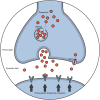Effects of GLP-1 Receptor Agonists in Alcohol Use Disorder
- PMID: 39891507
- PMCID: PMC11786240
- DOI: 10.1111/bcpt.70004
Effects of GLP-1 Receptor Agonists in Alcohol Use Disorder
Abstract
In the search for novel treatment strategies for alcohol use disorder (AUD), glucagon-like peptide-1 (GLP-1) receptor agonists (GLP-1RAs) approved for treating Type 2 diabetes and obesity have caught much attention. GLP-1 is a naturally occurring peptide produced in the small intestines and the brain, regulating plasma glucose levels and satiety. This focused review will report on the preclinical studies, case stories, register-based cohort studies, brain-imaging data and secondary analysis of clinical data supporting the role of GLP-1RAs as a novel treatment of AUD. Several clinical trials are ongoing, examining the potential effects of the GLP-1RA semaglutide in AUD.
Keywords: AUD; GLP‐1; alcohol use disorder; fMRI; glucagon‐like peptide‐1.
© 2025 The Author(s). Basic & Clinical Pharmacology & Toxicology published by John Wiley & Sons Ltd on behalf of Nordic Association for the Publication of BCPT (former Nordic Pharmacological Society).
Conflict of interest statement
M.K.K. has no conflict of interest. G.M.K. has received personal honoraria from H. Lundbeck, Sage Biogen and Sanos and serves as chair for SIAB in HBP (personal honorarium). T.V. has been part of speaker's bureaus, served on scientific advisory panels, served as a consultant to and/or received research support from Amgen, Boehringer Ingelheim, Eli Lilly, Gilead, AstraZeneca, Mundipharma, MSD/Merck, Novo Nordisk and SunPharmaceuticals. A.F.‐J. has received an unrestricted research grant from Novo Nordisk to investigate the effects of GLP‐1R stimulation on metabolic disturbances in patients with schizophrenia treated with antipsychotics and serves on an advisory panel for Novo Nordisk (no honorarium).
Figures

References
-
- WHO , “Global Status Report on Alcohol and Health 2018,” (2018).
-
- Askgaard G., Leon D. A., Deleuran T., and Tolstrup J. S., “Hospital Admissions and Mortality in the 15 Years After a First‐Time Hospital Contact With an Alcohol Problem: A Prospective Cohort Study Using the Entire Danish Population,” International Journal of Epidemiology 49, no. 1 (2020): 94–102, 10.1093/ije/dyz159. - DOI - PubMed
Publication types
MeSH terms
Substances
Grants and funding
LinkOut - more resources
Full Text Sources
Medical

